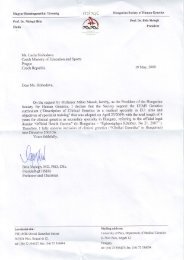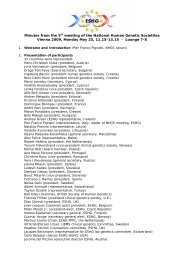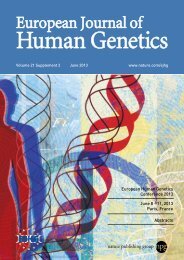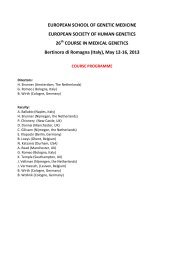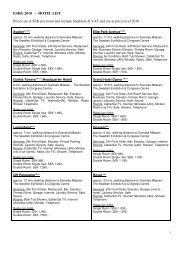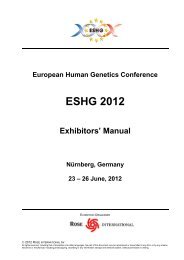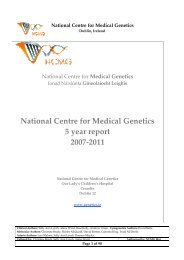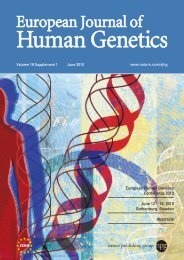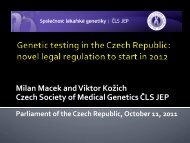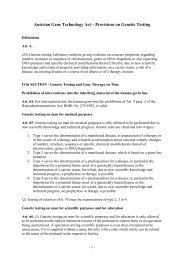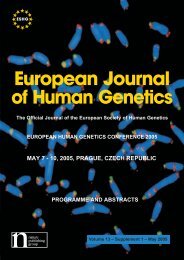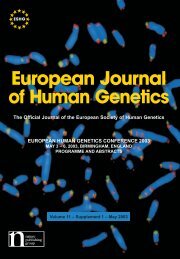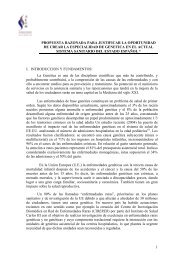2008 Barcelona - European Society of Human Genetics
2008 Barcelona - European Society of Human Genetics
2008 Barcelona - European Society of Human Genetics
Create successful ePaper yourself
Turn your PDF publications into a flip-book with our unique Google optimized e-Paper software.
Cancer genetics<br />
Techniques<br />
There is good evidence for the hypothesis that colorectal carcinoma<br />
initiation is progression from benign adenoma to carcinoma via a series<br />
<strong>of</strong> sequential somatic genetic and epigenetic changes . However<br />
it is not known whether genomic instability is a necessary initiating<br />
factor .<br />
We are currently recruiting patients with a known family history <strong>of</strong><br />
colorectal carcinoma or who are undergoing surveillance colonoscopy<br />
for recurrent polyps . These patients attend screening colonoscopy,<br />
where polyps are identified and removed. To date, 137 patients have<br />
been recruited with a total <strong>of</strong> 195 polyps .<br />
A pilot study, looking at markers (K-ras, BRAF, MSI, LOH) <strong>of</strong> genomic<br />
instability in 168 polyps in 107 patients demonstrated that this was<br />
technically feasible .<br />
We will collect 50 hyperplastic polyps and 300 adenomatous polyps,<br />
including 30 serrated adenomas, and 10 polyps from patients with<br />
Lynch syndrome .<br />
Isolated crypts will be extracted from polyps and tested for genomic instability<br />
using several parameters: chromosomal loss/gain, copy number<br />
variation, LoH, MSI and CPG-Island Promoter Methylation . We will<br />
also screen for mutations in known target genes .<br />
Results will be compared with normal tissue, to determine when/if<br />
genomic instability occurs, and it’s relationship to other (epi)genetic<br />
changes<br />
Conclusions<br />
We hope to elucidate the earliest drivers <strong>of</strong> colorectal carcinogenesis:<br />
when each form <strong>of</strong> genomic instability occurs, whether they initiate<br />
carcinogenesis and how this relates to family history and clinico-pathological<br />
features .<br />
P04.009<br />
microsatellites instability and mismatch repair genes mutations<br />
in hereditary nonpolyposis colorectal cancer<br />
C. IANCU1 , C. Vrabie2 , D. Iancu1 , G. Girbea1 , A. Constantinescu1 , C. Constantinescu1<br />
, E. Neagu1 , L. Barbarii1 ;<br />
1 2 National Institute <strong>of</strong> Legal Medicine, Bucharest, Romania, National Institute<br />
“Victor Babes”, Bucharest, Romania.<br />
Background: Hereditary nonpolyposis colorectal cancer (HNPCC) is<br />
an autosomal dominant cancer predisposition syndrome caused by<br />
germ-line mutations in DNA mismatch repair genes . Therefore diagnosis<br />
<strong>of</strong> genomic deletions <strong>of</strong> one or more exons <strong>of</strong> the MSH2 and MLH1<br />
genes and the analyse <strong>of</strong> microsatellite instability (MSI) from a minimal<br />
amount <strong>of</strong> highly damaged DNA is difficult.<br />
Methods. Formalin-fixed and paraffin-embedded tissue samples from<br />
25 HNPCC patients were analysed for microsatellite instability (MSI)<br />
using a panel <strong>of</strong> 7 markers (BAT-25, BAT-26, NR-21, NR-24, MONO-<br />
27, Penta C and Penta D) included in a commercial kit . MLPA tests<br />
were also performed to screen for major mutation in the mismatch repair<br />
genes MLH1 and MSH2 .<br />
Results . The study revealed a 58% microsatellite instability pattern for<br />
the 25 unrelated Romanian HNPCC patients . 5 to 10% <strong>of</strong> major alterations<br />
detected on the MLH1 and MSH2 genes are subject for further<br />
characterization .<br />
Conclusions . So far, family history, MSI and MMR gene mutation analysis<br />
become critical parameters for HNPCC genetic characterization<br />
and genetic counseling .<br />
P04.010<br />
microsatellite instability and promotor hypermethylation <strong>of</strong><br />
MLH and MSH in Bulgarian patients with sporadic colorectal<br />
cancer<br />
A. V. Mitkova 1 , T. Vlaykova 2 , G. Stancheva 1 , T. Kadiyska 3 , M. Gulubova 4 , E.<br />
Kostadinov 5 , D. Damyanov 5 , G. Cirovski 6 , Y. Yovchev 6 , I. Kremensky 3 , V. Mitev 7 ,<br />
R. Kaneva 1 ;<br />
1 Molecular Medicine Centre, Medical University-S<strong>of</strong>ia, S<strong>of</strong>ia, Bulgaria, 2 Dept.<br />
Chemistry and Biochemistry, Trakia University, Stara Zagora, Bulgaria, 3 National<br />
Genetic Laboratory, University Hospital <strong>of</strong> Obstetrics and Gynaecology<br />
“Majchin Dom”, Medical University-S<strong>of</strong>ia, S<strong>of</strong>ia, Bulgaria, 4 Dept. General and<br />
Clinical Pathology, Trakia University, Stara Zagora, Bulgaria, 5 Dept. Gastroenterology,<br />
University Hospital “Queen Giovana”, Medical University-S<strong>of</strong>ia, S<strong>of</strong>ia,<br />
Bulgaria, 6 Dept. General Surgery, Medical Faculty, Trakia University, Stara<br />
Zagora, Bulgaria, 7 Dept. Chemistry and Biochemistry, Medical University-S<strong>of</strong>ia,<br />
S<strong>of</strong>ia, Bulgaria.<br />
Inactivation <strong>of</strong> the genes involved in DNA mismatch repair is associated<br />
with microsatellite instability (MSI) and loss <strong>of</strong> heterozygosity<br />
(LOH) . Mutations in MLH1 and MSH2 genes are usually the cause <strong>of</strong><br />
hereditary colorectal cancers (CRC), such as HNPCC, while microsatellite<br />
instability in sporadic CRC <strong>of</strong>ten results from epigenetic inactivation<br />
<strong>of</strong> hMLH1 due to DNA promotor methylation .<br />
We examined MSI in 98 patients with sporadic CRC and the methylation<br />
status <strong>of</strong> the MLH1 and MSH2 promotor regions in the cases with<br />
MSI/LOH. MSI was evaluated in a panel <strong>of</strong> five microsatellite markers<br />
(BAT26, D5S346, D18S35, D2S123 and FGA) and the hypermethylation<br />
assessed by methyl-specific PCR (MSP) <strong>of</strong> bisulfite converted<br />
DNA . The PCR products were analyzed on agarose gel electrophoresis,<br />
following by direct sequencing .<br />
Our results demonstrated MSI/LOH in 29 patients (29 .5%) with sporadic<br />
colorectal cancer . Among them the promoter hypermethylation<br />
<strong>of</strong> MLH1 was observed in 14 (48 .3%) <strong>of</strong> the cases, whereas promotor<br />
hypermethylation <strong>of</strong> MSH2 was observed only in one case (3 .4%) . The<br />
epigenetic changes <strong>of</strong> MLH1 were associated with loss <strong>of</strong> the protein<br />
expression .<br />
Conclusions: Widespread promotor methylation <strong>of</strong> tumor suppressor<br />
genes is a common mechanism <strong>of</strong> gene inactivation during tumorigenesis<br />
. Our results suggest that microsatellite instability in Bulgarian<br />
patients with sporadic CRC and the epigenetic inactivation <strong>of</strong> hMLH1<br />
in association with DNA methylation occurs in similar frequency to relative<br />
studies <strong>of</strong> sporadic colorectal cancer . The promoter hypermetilation<br />
<strong>of</strong> MSH2, although a rare event, is also a possible cause <strong>of</strong> mismatch<br />
repair system deficiency in this type <strong>of</strong> CRC.<br />
P04.011<br />
implication <strong>of</strong> MSH mutations in colorectal cancer (cRc)<br />
patients carrying a monoallelic MYH mutation<br />
M. D. Giráldez 1 , F. Balaguer 1 , T. Caldés 2 , N. Gómez-Fernández 3 , C. Ruiz-Ponte<br />
3 , J. Muñoz 1 , V. Gonzalo 1 , T. Ocaña 1 , J. Cl<strong>of</strong>ent 4 , A. Carracedo 3 , A. Castells 1 ,<br />
S. Castellvi-Bel 1 , A. E. G. Gastrointestinal Oncology Group 5 ;<br />
1 Gastroenterology, Hospital Clínic, IMDiM, CIBEREHD, IDIBAPS, <strong>Barcelona</strong>,<br />
Spain, 2 Oncology Molecular Lab, Hospital Clínico Universitario San Carlos, Madrid,<br />
Spain, 3 Grupo de Medicina Xenomica-USC-FPGMX-CIBERER, Santiago<br />
de Compostela, Spain, 4 Gastroenterology Department, Hospital Meixoeiro-<br />
CHUVI, Vigo, Spain, 5 Asociación Española de Gastroenterología, <strong>Barcelona</strong>,<br />
Spain.<br />
Background . CCR risk associated with germline monoallelic MYH mutations<br />
remains controversial . Nevertheless, a slight increased risk has<br />
been suggested . MYH and MSH6 proteins act together during the DNA<br />
reparation process . It has been shown that individuals harboring mutations<br />
in both genes could have an increased CRC risk .<br />
Aim . To evaluate the prevalence <strong>of</strong> MSH6 mutations in CRC patients<br />
carrying a monoallelic mutation in MYH .<br />
Patients and methods . We analyzed the prevalence <strong>of</strong> MSH6 mutations<br />
in a CRC patients cohort with and without a monoallelic MYH mutation<br />
(group I, n=26 and group II, n=50, respectively), and in another<br />
cohort including healthy controls with and without a monoallelic MYH<br />
mutation (group III, n=21, group IV, n=21, respectively) . Patients and<br />
controls were recruited from EPICOLON and Hospital Clinic, respectively<br />
. Mutational screening was performed by TaqMan, SSCP, DHPLC<br />
and sequencing .<br />
Results . We detected three germline MSH6 mutations in group I<br />
(11 .5%), a missense variant (R635G), a change in 3’UTR region<br />
(4098A>C) and a nonsense mutation (Q982X) . We did not detect any<br />
MSH6 mutation in groups II and IV, whereas only one was found in<br />
group III (4 .8%) (M1326G) . MSH6 mutations were more frequently<br />
found in CRC patients with a monoallelic MYH mutation than in noncarriers<br />
(11 .5% vs 0%, p=0 .037) .<br />
Conclusions . CRC patients harboring a monoallelic MYH mutation may<br />
carry more frequently a MSH6 mutation than patients without them .<br />
We could hypothesize that the CRC predisposition associated with a<br />
mutation in each gene could add up and confer an increased risk .



